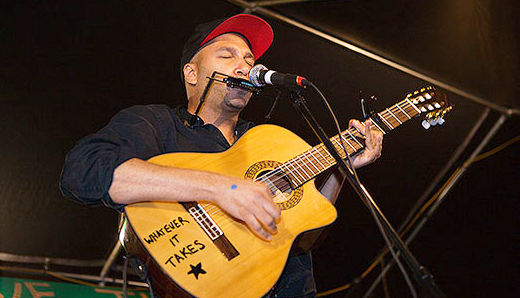
This is the season of ‘best of the year’ and ‘best of the decade’ lists when it comes to books, movies, music, and more. I decided to compile a list of some of the best and most influential protest music from the past ten years.
While talking about my idea for the article to friends and coworkers, some wondered: “Protest music of the last ten years? Was there any?” My answer is, definitely yes! No, you don’t have to look back to Phil Ochs, Marvin Gaye, Woody Guthrie, or Joan Baez to find great political music. Turns out the tumultuous 2000s (or “naughts” or whatever you call the past decade) turned out some great protest songs. So here is my list; I look forward to hearing from you about those I’ve missed.
War and Peace
The U.S. wars in Iraq and Afghanistan certainly inspired a lot of anger and outrage from people all over the world. The wars also inspired many songs.
One you may have missed is “That’s the news” from country music veteran Merle Haggard. Though his most famous songs, “Okie from Muskogee,” which ridiculed pot-smoking hippies and anti-war protestors in the late 1960s, and the follow-up, “Fightin’ side of me”, are likely more satirical than they were interpreted by listeners at the time, Haggard’s music was embraced as pro-war anthems.
But Haggard is clearly no hawk when it comes to the Iraq War. First, Haggard defended Texan band the Dixie Chicks after some country music artists and fans pilloried them for criticizing President George W. Bush. Then in 2003, not long after Bush declared “victory” on the deck of the USS Abraham Lincoln, Haggard’s song complained that,
Suddenly it’s over, the war is fin’lly done.
Soldiers in the desert sand, still clingin’ to a gun.
No one is the winner an’ everyone must lose.
Suddenly the war is over: that’s the news.
UK reggae band UB40 released “Who are you fighting for?” in 2005 on the Grammy-nominated album of the same name. The chorus chants,
You do the shooting – they do the looting
You do the killing – they do the drilling
You do the dying – they do the lying
All the way to the bank
You can hear them crying
Alternative rock giants Pearl Jam dropped their song “World wide suicide” in 2006, seeing it top the Modern Rock charts for three weeks.
2003’s “Power to the peaceful” is the timeless anthem of Pittsburgh’s anarchist punk sensation Anti-Flag. It screams,
Sons and daughters of a dream
The urge to struggle for an ideal
To stay and fight
Oppose war fever
Refuse to kill or be killed
“Peace, salaam, shalom”, by Emma’s Revolution is as close to an official anthem as we have for the peace movement that emerged against the Bush-era wars. I remember it being performed on stage at the first big national anti-war protest after 9-11 on April 20, 2002, in Washington DC. Peace activists around the U.S. and the globe sing the song today. It succinctly reminds us that peace is a universal principle and goal.
Neil Young wrote “Ohio,” one of the greatest anti-war songs of all time. After the September 11 terrorist attacks, the expat Canadian also released “Let’s roll.” Inspired by the famous quote from Todd Beamer, a passenger on Flight 93 that crashed in Pennsylvania after being hijacked that day. The song is a not-so-subtle paean to Bush’s “war on terror” with the idea that “we’re going after Satan.” But with the 2006 album Living with War, Young returned to form. Skip the clunker of a song “Impeach the President” (right sentiment, bad song) and go to the title track “Living with War.”
British folksinger Billy Bragg wrote “Price of oil” (here being sung at AFL-CIO headquarters in a get-out-the-vote rally in October 2002) to question the motivation for U.S. aggression in the Middle East.
“Boom!” is a loud and raucous cry against war by Armenian-American hardrockers System of a Down who themselves marched along with millions of others (the “other superpower”) on February 15, 2003, to stop the war on Iraq before it began.
The title of “Counting bodies like sheep to the rhythm of the war drums” by rock supergroup Perfect Circle speaks for itself.
One of the great strengths of today’s peace movement is the large participation by and leadership from veterans, military families, and even active duty soldiers. Many of today’s anti-war songs focus on the plight of the soldier killing and dying for wars based on lies. They remind us that being for peace is not being against the troops, but just the opposite.
Country band Reckless Kelly are hardly activists, but their song “American blood” documents the horrors of war and their impact on veterans:
Johnny can’t drink ’cause Johnny ain’t twenty-one
But he’s eighteen and pretty handy with a gun
They shipped him off to a foreign land gave him a new pair of boots and thirteen grand
And he came back home with American blood on his hands
The song mocks Bush by comparing the guilt of “George” to “Johnny.” Reckless Kelly even set up a website, Reckless Soldiers as a place for active duty military to post pictures for family and friends.
In a similar vein is “Hero of War” by activist rockers Rise Against. The song and the accompanying video first appear to be a military recruitment video with folk-rock strumming which grows increasingly loud and harsh as the tale of young soldiers in Iraq turns dark.
Boots from Oakland Marxist hip-hop group The Coup penned the song “Captain Sterling’s little problem” for the award-winning documentary film “Sir! No sir!”, which tells the story of the G.I. rebellion during the Vietnam War. But the song recalls Iraq as well. The song was released on Pick a Bigger Weapon along with “My favorite mutiny” another song about military resistance featuring rappers Black Thought and Talib Kweli.
In “The day after tomorrow” Tom Waits brings us another great song from the point of view of a soldier at war. It could be about Iraq, Afghanistan, Grenada, Korea, or anywhere:
You can’t deny
The other side
Don’t want to die
Any more than we do
What I’m trying to say,
Is don’t they pray
To the same God that we do?
Tell me, how does God choose?
Whose prayers does he refuse?
Brooklyn, New York’s Antibalas Afrobeat Orchestra (which is currently performing on Broadway as part of the musical Fela! based on the life of African musical revolutionary Fela Anikulapu Kuti) brought us the song “War hero” on their 2007 album Security. Its rolling grooves, blazing horns, and poetic and ruthless lyrics are reminiscent of the best of afrobeat music.
Country singer-songwriter Steve Earle delivered one of the great protest albums of the decade in the Best Contemporary Folk Album Grammy-winning Revolution Starts Now. “Rich man’s war” (Here’s Earle singing the track at the Operation Ceasefire concert during the September 24, 2005, anti-war march in Washington DC) is just one of many outstanding tracks on the album.
Hip-hop artist Nas has several politically themed songs in the past period, but “Rule” dropped in 2001 before many mainstream rap acts started adding anti-Bush comments in rhymes. Nas was inspired by the Afghan war but goes on to condemn poverty, police harassment, and violence at home.
The Bush Years
War wasn’t the only thing that inspired the creativity of songwriters in the past ten years. We did have eight years of the scariest President in history beginning with a stolen election and peppered with inane quotes, ignorance, and underpinned by corporate rapine.
Pop-punk giants Green Day sum up many people’s view of Bush with their hit, “American Idiot,” which isn’t really about George, but about the paranoia and ignorance of the Bush years. It was the title track of the 2004 rock opera album by the band that told the story of the “Jesus of Suburbia”. The highly political album rocketed the band to international stardom, selling over 20 million albums and winning the Best Rock Grammy. American Idiot is now headed to Broadway in March in the form of a new musical featuring another Green Day single “21 Guns” a more recent antiwar song from the band.
The ultra-offensive rapper Eminem, who usually inundates audiences with sexist and violent fantasies took a turn toward conscientious lyrics with his 2004 election eve single and stunning video for “Mosh” (Pre-election version and post-election version), which was a cry for voter participation bordering on social revolt:
And as we proceed, to mosh through this desert storm, in these closing statements,
if they should argue, let us beg to differ, as we set aside our differences,
and assemble our own army, to disarm this weapon of mass destruction
that we call our president, for the present,
and mosh for the future of our next generation,
to speak and be heard, Mr. President, Mr. Senator
Indie rock artist Bright Eyes created some controversy when he performed on the Tonight Show with Jay Leno and sang “When the President talks to God” which plays on the many claims by Bush that God speaks to him and that God wanted him to run for President:
When the president talks to God
Are the consonants all hard or soft?
Is he resolute all down the line?
Is every issue black or white?
Does what God say ever change his mind
When the president talks to God?
You can still download the song for free on iTunes.
Immigrants and indigenous people
Few outside the Pacific islands may know of Hawaii-based reggae artist Fiji. But you should. His groovy reggae romp, “Indigenous life” is an easy-skanking anthem calling for the unity of all Pacific islanders, but is relevant to all struggles by indigenous people and any music fans everywhere.
“Migra” by East Los Angeles band Quetzal is a song about the terror created by the immigration enforcement raids in immigrant communities.
“The Word” by Los Lobos joins “What’s going on” and “The times they are a-changin'” as one of the great sweeping songs of the political moment. The now veteran Chicano band from L.A. lays down a bluesy rhythm to deliver a message of sticky problems and brewing change:
What will you say or do
When a child asks of you
What kind of world have you left here for me?
Too many sleepless nights
Too many questions why
This is not the way it’s supposed to be
What happened to
The land, the trees, and the rivers
Some have now all gone away
What happens if
We see them as sisters and brothers
Like the good Lord says we should
The times they are a-changin’
Protest songs don’t just catalog the ills of society or decry injustice and war. Some of the greatest political songs have the ability to sum up the political moment, to capture the essence of the new period emerging from the old. Those unique musical artists that put their finger on that intangible essence are able to create timeless classics.
Socialist hip hop duo Dead Prez are known for their black power militancy and calls for revolution, but perhaps their most politically resonant and lasting song is “I’m an African”, a highly charged, pulsing black pride credo that rocked the dance floors around the country as well as rocked minds.
In the 2000s Tom Morello of the groundbreaking activist head-bangers Rage Against the Machine took on the identity of The Nightwatchman, a guitar-wielding activist, like a Woody Guthrie for the new millennium. Morello together with Serj Tankian of System of a Down (see above) also founded Axis of Justice, a nonprofit organization dedicated to progressive social change and music-making. The Nightwatchman’s “The road I must travel” is a classic political ballad for our age.
Michael Franti has been on the cutting edge of progressive music for 25 years. From punk band Beatnigs to the culture-jamming Disposable Heroes of Hiphoprisy and now his funky dance-rock band Spearhead, Franti has been innovative musically and politically for a quarter-century. His song “Yell fire” gets crowds raising their lighters at rallies as well as dance clubs:
A revolution never come with a warning
A revolution never sends you an omen
A revolution just arrived like the morning
Ring the alarm, we come to wake up the snoring…
Yell Fire, yo, yo, yo
Here we come, here we come
Fire, yo, yo, yo, yo
Revolution a comin’
John Mayer’s “Waiting on the world to change” was not only a generational ballad of social change it was one of the biggest commercial hits in pop music. The song is less of a call to action than a pleading lament about inaction and the tasks at hand:
Me and all my friends
We’re all misunderstood
They say we stand for nothing and
There’s no way we ever could
Now we see everything that’s going wrong
With the world and those who lead it
We just feel like we don’t have the means
To rise above and beat it
So we keep waiting
Waiting on the world to change
We keep on waiting
Waiting on the world to change
Katrina and New Orleans
Hurricane Katrina and the government’s inept and criminal response to it shocked the world and many musical artists spoke out. Hip hop star Kanye West famously said “George Bush doesn’t care about Black People” in reference to the former President’s lack of response to the flooding of New Orleans in Katrina’s wake. New Orleans, a city renowned for musical heritage also faced the displacement of its many working musicians. Fans, fellow artists, and others came together to support New Orleans Habitat Musicians Village which was founded by the city’s own singer Harry Conick Jr. to ensure the rebuilding of New Orleans includes song. Katrina and the destruction of New Orleans and the Gulf Coast also inspired many songs.
Singer-songwriter Catie Curtis won the International Songwriting Competition, Grand Prize in 2005 for her song “People look around” which is a meditation on humanity, community, rain, Katrina, and the war.
New Orleans band The Subdudes on their album Behind the Levee perform the funky soul song “One word (Peace)” which portrays a scene from communities around the country these past few years:
A man stands on the corner holding a sign
People yell at him as they drive by
I wonder what they read, made them so upset
I looked at the sign and all it said:
One word: Peace
Hip hop sensation Lil’ Wayne who calls from the Ninth Ward of New Orleans made a change of pace with his song “Tie my hands” featuring crooner Robin Thicke. The song, which he performed at the 2009 Grammy Awards is an R&B-tinged meditation on NOLA and the lives of those who call her home.
If you haven’t seen the Academy Award-nominated documentary Trouble the Water, do so. The film features the experiences of Kimberly Rivers Roberts, a.k.a. hip hop artist Black Kold Madina and her family and friends during and after Hurricane Katrina. Madina’s title song for the film, “Trouble the Water,” is a brutal raging testimony to the tragedy in New Orleans.
The international scene
I haven’t said anything so far about music from around the world. As a big fan of African music, I have to give a big nod to Lapiro de Mbanga, the jailed Cameroun musician, whose song “Constitution constipée” (Constipated Constitution) helped bring thousands into the streets of the West African Nation in 2008 in protest of the abuses of the Biya Presidency and landed him in jail on trumped-up charges. De Mbanga won the 2009 ‘Freedom to Create Imprisoned Artist Prize but remains in poor health in a prison cell. You can download this song and an entire tribute album Libérons Lapiro! – Free Lapiro! for free if you sign the petition calling for his freedom.
Sierra Leone’s Refugee All Stars garnered international success with their 2005 album Living Like a Refugee and the amazing documentary film Sierra Leone’s Refugee All Stars, which was produced by hip-hop artist Ice Cube among others. Leonean refugees fleeing the Sierra Leone civil war formed the band in a refugee camp in Guinea. The song, “Living like a refugee (it’s not easy)” speaks to the experience of millions of people worldwide that are forced to migrate from their homes by war, poverty, climate change, and political upheaval. You can download a free track from the upcoming new album.
“Uh ah Chávez no se va!” by Grupo Madera became the de facto anthem of the movement in support of President Hugo Chavez of Venezuela following the attempted coup there.
Another song dedicated to the Bolivarian Revolution in Venezuela is “Avanza” by popular singer Gustavo Arreaza. He sings:
La revolución que avanza
Por los cielos abiertos
No conoce fronteras
No tiene final
(In English:
The revolution advances
For the open skies
It has no boundaries
It has no end)
Algerian-born Cheb Mami who is a hit-maker in France with his mix of hip hop and raï, Algerian popular music, releases “Parisien du norde” with rapper K-Mel in 2005 to protest racism and discrimination in his adopted home in the wake of race riots in Paris.
Obama and the 2008 elections
A seemingly countless number of songs were inspired by the historic 2008 Presidential race of Barack Obama. Others celebrated his victory. Reggae and soca artists seemed to be particularly fond of Obama songs. There are far too many to list, but here are some of the most notable:
Ani Difranco – “November 5, 2008”
Spearhead – “Barack Obama”
Extra Golden – “Obama”
Cocoa Tea – “Barack Obama”
Rankin Cobra – “Obama”
Sizzla – “Black man in the White House”
Mighty Sparrow – “Barack de magnificent”
Steel Pulse – “Vote Barack”
Will.i.am and friends – “Yes we can”
Classic Protest Songs
Even though this article isn’t about them, the classic songs of protest from the American folk revival, against the Vietnam War still had an impact on the struggles and movements of the past ten years, so it’s no surprise that today’ artists record and perform cover versions of the classic progressive music of the 1930s and 1960s.
The best of these—and one of the best all-around albums of the decade to boot—is We’ll Never Turn Back by gospel/soul singer Mavis Staples of the Staple Singers, who were Dr. Martin Luther King Jr.’s favorite artists. The album features cover versions of classic songs from the U.S. civil rights movement and a couple of instant classics too.
Folk pioneer and indigenous rights activist Buffy St. Marie, who penned the anti-war standard “Universal soldier” released Running For the Drum in 2009, her first album in seventeen years. The song “Working for the government” is a bluesy driving song about bureaucrats and abuse of power, while her rendition of “America the Beautiful” has a special poignancy.
More great protest song revival albums include Bruce Springsteen’s We Shall Overcome: The Seeger Sessions; Dolly Parton’s Those Were the Days; Pete Seeger’s Pete Seeger At 89; and Keb’ Mo’s Peace… Back by Popular Demand.
One interesting development is the proliferation of numerous cover versions of and variations on Woody Guthrie’s classic song of America, “This land is your land.”
Mexican American singer and global star Lila Downs made a classic cover of the song in the form a searing medley with another Guthrie classic “Pastures of Plenty/This land is your land/Land” on the album La Linea (Border). Downs, who gained fame for her Academy Award-nominated “Burn it Blue” from the movie Frida, reminds us that “This land is your land” truly embraces our nation of immigrants.
The grooviest, smoothest, most danceable version ever was laid down by Brooklyn soul band Sharon Jones & the Dap Kings. Their “This land is your land” transforms the song into a soul standard.
Inspired by the massive outpouring of immigrant activism and pride in the Immigrant Workers Freedom Ride and the huge May Day protests of the last few years, Juan Dies of the band Sones de Mexico translated the song into “Esta tierra es tuya” from the Grammy Award-nominated album of the same name. The band reworked it into a Norteño anthem of the immigrant rights movement (great video too).
I close my long (but still insufficient because I have about twenty other songs I want to add off the top of my head) listing of protest songs from the last decade with a tribute to the late great Julius Margolin, who passed away late last year. Julie was a good friend and a reminder to one and all that music is for everyone.
His albums, produced together with musician George Mann, tracked the progression of the past ten years in politics and protest song:
Hail to the Thief! Songs For The Bush Years (2001)
Hail To The Thief, Vol. II: Songs To Send Bush Packing! (2004)
Hail To The Thieves, Vol. III: Songs to Take Our Country Back! (2008)
So, I hope that puts a rest to the idea that there was little or no protest music in the past period. It should also put to rest the idea that acoustic guitar is the only vehicle for a progressive troubadour.
Today’s protest music can be a soul salutation, a punk rock rage, a head-banging rant, an electronic orchestration, a bold beatbox, a rap attack, and even a strumming song. We certainly had our fair share of struggles, tragedies, bracing defeats, and historic victories.
It’s no wonder the music was there at each step.


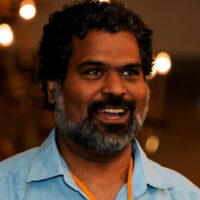
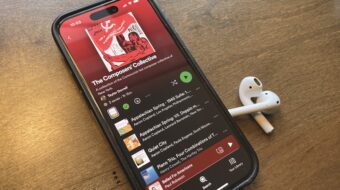
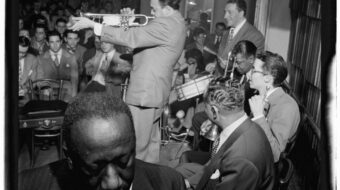
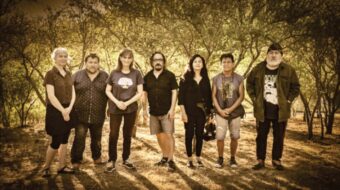






Comments